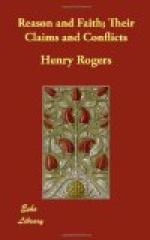* To Christ alone, of all the characters ever portrayed to man, belongs that assemblage of qualities which equally attract love and veneration; to him alone belong in perfection those rare traits which the Roman historian, with affectionate flattery, attributes too absolutely to the merely mortal object of his eulogy: ’Nec illi, quod est rarissimum aut facilitas auctoritatem, aut severitas amorem, deminuit.’ Still more beautiful is the Apostles description of superiority to all Human failings, with ineffable pity for human sorrows: ’He can be touched with the feelings of our infirmities, though without sin.’ + Was there ever in truth a man who could read the appeals of Paul to his converts, and doubt either that the letters were real or that the man was in earnest? We scarcely venture to think it. ____
If, on the other hand, he supposes that all the congruities of which we have spoken, were the effect not of fraudulent design, but of happy accident,—that they arranged themselves in spontaneous harmony—he must believe that chance has done what even the most prodigious powers of invention could not do. And lastly, he must believe that these same illiterate men, who were capable of so much, were also capable of projecting a system of doctrine singularly remote from all ordinary and previous speculation; of discerning the necessity of taking under their special patronage those passive virtues which man least loved, and found it must difficult to cultivate; and of exhibiting, in their preference of the spiritual to the ceremonial, and their treatment of many of the most delicate questions of practical ethics and casuistry, a justness and elevation of sentiment as alien as possible from the superstition and fanaticism of their predecessors who had corrupted the Law—and the superstition and fanaticism of their followers very soon corrupted the Gospel; and that they, and they alone, rose above the strong tendencies to the extravagances which had been so conspicuous during the past, and were soon to be as conspicuous in the future.—These and a thousand other paradoxes (arising out of the supposition that Christianity is the fraudulent or fictitious product of such an age, country, and, above all, such men as the problem limits us to), must the infidel receive, and receive all at once; and of him who can receive them we can but once more declare that so far ‘from having no faith’, he rather possesses the ‘faith’ which removes ’mountains!’—only it appears that his faith, like that of Rome or of Oxford, is a faith which excludes reason.
On the other hand, to him who accepts Christianity, none of these paradoxes present themselves. On the supposition of the truth of the miracles and the prophecies, he does not wonder at its origin or success: and as little does he wonder at all the literary and intellectual achievements of its early chroniclers—if their elevation of sentiment was from a divine source, and if the artless harmony, and reality of their narratives was the simple effect of the consistency of truth, and of transcription from the life.




